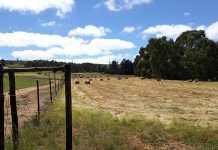
Scientists relate that research funds are more readily available if their proposals have something to do with ‘sustainanility’. Consumer journalists love the term, and the retail chain stores have realised they can use ‘sustainability’ to differentiate the food on their shelves from the identical product on another chain’s shelves.
Since there’s very little difference between products produced with normal farming methods and those produced using ‘environmentally friendly’ methods, advertising tries to tell the consumer the latter types of products are inferior. To further differentiate their products, the retail chains interfere in farming practices, telling farmers exactly how they should farm. The benefits to the environment (and therefore society at large) are trumpeted. The extra costs borne by the consumer
are not mentioned. And the truth falls by the wayside.
In a recent lecture, for example, a spokesperson for a well-known retailer stated that the mineral content of meat and milk had decreased alarmingly over the past 30 years. This is not true. Actually, as consumers moved to less fatty products, the mineral content increased. In the same lecture, it was alleged that 1 000l of water was used to produce 1l of milk. Even if you ignore the fact that a lot of the water used evaporates and will in time return to the soil as rain, the figure of 1 000l is ridiculous.
What does sustainable mean?
When consumers face economic pressure, they care more about quality and value for money than ‘production methods’.
This was recognised when the recession hit in 2008 and the focus of many advertising campaigns changed from ‘whatever-friendly’ to ‘affordable’.
When asked to define ‘sustainability’, a large Argentinian dairy farmer said: “To me, sustainability means profitability.” This is true for most farmers. If farming is not profitable, there are no funds left to spend on environmental and social aspects. Additional burdens in terms of certification and audits add to farmers’ costs without really contributing much to their profits.
Insistence on ‘GM-free’ production methods actually means farmers have to use more chemicals in their production process.The fact that the retail sector over-emphasises the perceived quality of non-GM, ethical and environmentally friendly food does not mean farmers can ignore good agricultural practices, though.
It makes very good economic sense to limit the use of purchased inputs such as fertiliser and chemicals. Biological farming methods can add to productivity while limiting cost. Energy-efficient machinery and cultivation practices such as min-till contribute to lower energy use.
Animal welfare
There’s still a perception among some consumers that farmers mistreat their animals. And unfortunately, the rare cases where animals are mistreated make good front-page copy for newspapers. No progressive farmer who needs high production from livestock will mistreat their animals. ‘Factory farming’ is a very emotive term, conjuring up images of cattle or pigs being kept in dark, wet and crowded conditions.
The truth is that, in most cases, when dairy herds are put into housing the longevity of the cows increases and they suffer fewer foot injuries. Yet ‘free range’ products are more expensive. When challenged about their insistence on ‘free-range’ requirements, retailers are quick to point out that this is what consumers want. However, it’s doubtful that, if left alone,
the average consumer would choose steak from a calf fed GM maize over one fed GM-free maize, especially if the former were cheaper.
Already there
The majority of farmers already use environmentally friendly production methods, ethical labour practices and are socially
responsible for the people on their farms. They are involved with the well-being of their workers and workers’ families.
They’re also involved in local communities – visit a retirement home in any of the small towns and you’ll see the amount of food provided by nearby farmers.
Unfortunately, the farming community still has a lot of work to do in order to convince consumers that they are responsible citizens. In this, they need the cooperation of the retail sector.
Dr Koos Coetzee is an agricultural economist at the MPO. All opinions expressed are his own and don’t reflect MPO policy.




